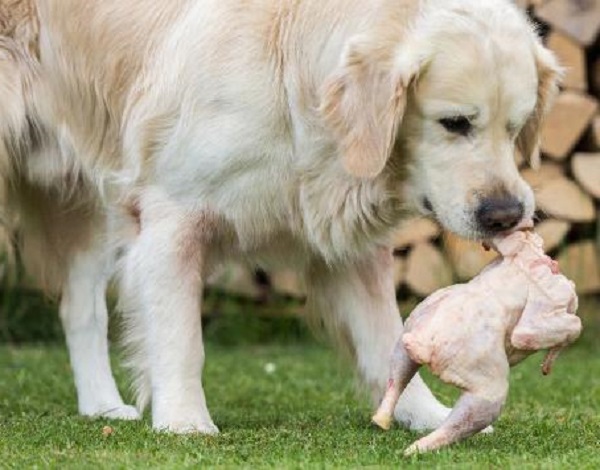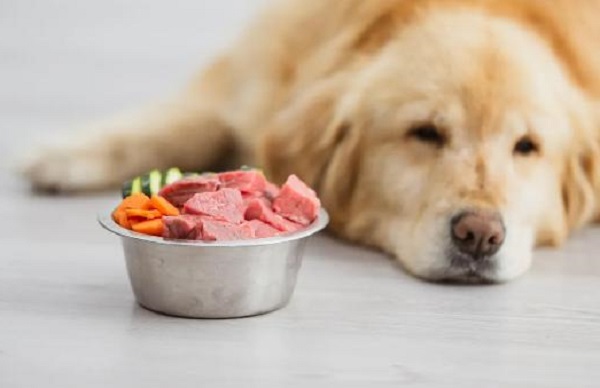Delve into the discourse on whether dogs can consume raw chicken as we unravel the risks and benefits associated with this dietary choice. While conventional wisdom discourages the inclusion of raw chicken in dogs’ regular meals due to potential bacterial contamination and digestive hazards, proponents argue for its natural and unprocessed advantages, drawing parallels to their ancestral wolf lineage. To navigate this nutritional debate, it’s imperative to explore the nuances and collaborate with veterinarians to ensure a balanced and safe raw food diet for our canine companions. Join us on this exploration of Can Dogs Eat Raw Chicken? as we shed light on the intricacies of this contentious topic.

Can Dogs Eat Raw Chicken?
Examining the potential for adding raw chicken to your dog’s diet brings important safety and health concerns into focus. Although some dogs may not become sick right away from eating raw chicken, it is typically considered dangerous for dogs because of the serious hazards involved.
Veterinary experts, such as the American College of Veterinary Nutrition and the American Veterinary Medical Association, advise against feeding dogs raw food. The claimed advantages are often based on anecdotal evidence, and the possible risks include the possibility of infections and digestive system disturbances. Additionally, dogs who consume a diet high in raw chicken may be at risk for nutritional deficiencies.
Prioritize your dog’s health and speak with a veterinarian to make sure their diet is healthy and well-balanced before considering adding raw chicken to their meals. Discover the nuances around the issue “Could Dogs Eat Raw Chicken?” so that you can decide on your dog’s diet with knowledge.
What are the benefits and risks of feeding raw chicken to dogs?

Risks
- The campylobacteriosis: Dogs who consume raw chicken may get campylobacteriosis due to exposure to the campylobacter bacterium. Diarrhea is one of the symptoms, which in dogs older than six months may last for up to fifteen days. The diarrhea might be watery, bloody, or include bile or mucus. To treat this bacterial illness, veterinary diagnosis and treatment—including supportive care and antibiotics—are crucial.
- Chicken Bones: Raw chicken contains bones, which puts dogs at serious danger. Bones may break teeth, get trapped in the mouth or throat, pierce internal organs, and create blockages in the stomach or digestive system. Reduce the likelihood of these problems by keeping your dog safe by eliminating the bones from raw chicken.
- Malnutrition: Serious malnutrition may result from feeding dogs just raw chicken as their main food source. Although chicken has some nutritional value, it doesn’t provide the vital vitamins and minerals needed for a well-rounded diet. Organ malfunction and other health problems, such as fractured bones, may result from this shortage. In order to guarantee the best possible health for your dog, raw chicken should be included to a full, well-balanced meal that satisfies all nutritional needs.
Benefits
- Rich in Protein: Raw chicken is a superior source of protein that is necessary for the growth and repair of muscles as well as the general health of canines. Dogs can maintain their ideal levels of energy and muscular mass thanks to the natural protein content.
- Low in Sugar and carbs: Raw chicken has no sugar or carbs, in contrast to certain commercial dog meals. For dogs with certain dietary requirements, such those who are prone to weight problems or have certain medical disorders that call for a low-carb diet, this trait may be helpful.
- Rich in Nutrients: Raw chicken is a good source of zinc, magnesium, phosphorus, potassium, and vitamin B12. These nutrients help bone health, metabolic processes, and general vigor in dogs, among other physiological activities.
- Cost-Effective Protein Source: Chicken is often a cheap protein source, making it available to pet owners looking for affordable, nutrient-dense options for their dogs.
How to Proceed If Your Dog Consumes Uncooked Chicken
Whether it’s from the garbage or the counter, if your dog gets into raw chicken, it’s important to act quickly and keep a tight eye on them the next day. A number of factors, such as the size of your dog, how much chicken they eat, and their general health, might affect the possibility of negative consequences. However, after eating raw chicken, a lot of dogs may not become sick and could even be well.
- Observation: Watch out for any odd behavior, dietary changes, or indications of intestinal trouble in your dog. Keep an eye out for any irregularities in their bowel motions.
- Get in touch with your veterinarian: Please get in touch with your veterinarian right away if you have any concerns or suspect that your dog may have eaten chicken bones. They can provide individualized advice on the best course of action since they are knowledgeable with the medical history of your dog.
- Timely veterinarian Visit: Seek veterinarian care right away if your dog shows any symptoms of discomfort, including diarrhea, vomiting, lethargy, or any other unusual behavior. Prompt action guarantees prompt resolution of any possible health problems resulting from eating raw chicken.
FAQ
Are there other raw meats that dogs can eat?
In addition to raw chicken, dogs can benefit from other raw meats such as beef, pork, fish, and lamb. Each option has its considerations—ensuring beef quality, exercising caution with pork due to potential parasites, selecting fish carefully to avoid toxins, and prioritizing high-quality lamb. Always consult your veterinarian before introducing new raw meats, ensuring a safe and balanced diet tailored to your dog’s unique needs. Regular veterinary guidance is vital for a healthy raw food plan.
Can Raw Chicken Liver Be Eaten by Dogs?
Yes, dogs can safely enjoy raw chicken liver as part of a balanced raw diet. Packed with essential nutrients like copper, vitamin A, folic acid, B vitamins, and iron, it constitutes around 5% of a recommended raw diet for dogs. This nutrient-rich option adds valuable health benefits to your dog’s overall well-being. Always consult your veterinarian for guidance on incorporating raw chicken liver into your dog’s diet for optimal balance and safety.
Conclusion
The question of whether dogs can eat raw chicken unveils a nuanced landscape of risks and benefits. While raw chicken offers potential nutritional advantages, the associated risks, such as bacterial contamination and bone hazards, cannot be overlooked. Striking a careful balance by consulting with veterinarians, considering individual dog factors, and ensuring a well-rounded diet can pave the way for a safe and beneficial incorporation of raw chicken into a canine’s nutrition. Responsible pet ownership hinges on informed decisions and regular veterinary guidance, ensuring the overall health and well-being of our cherished four-legged companions.
